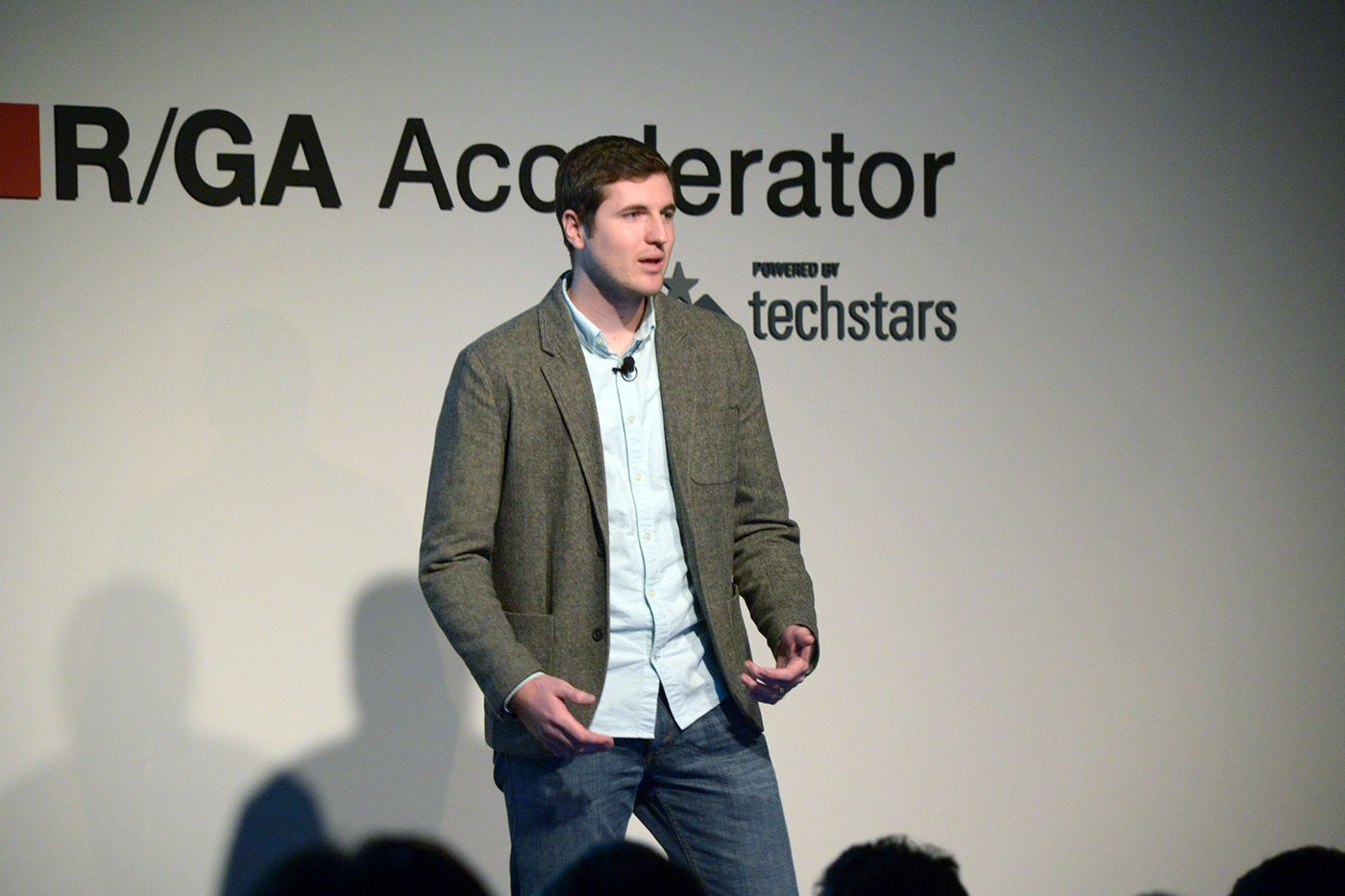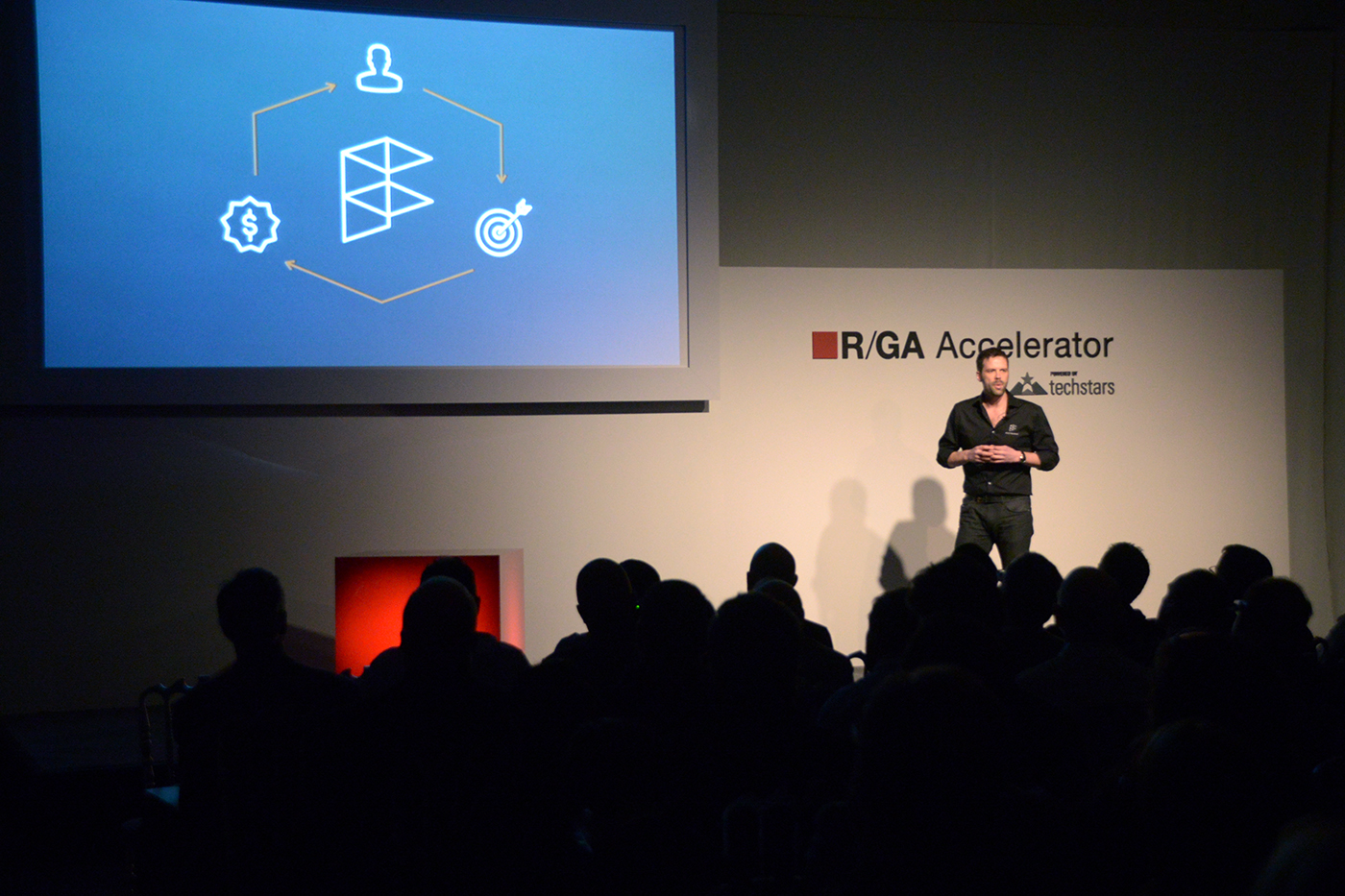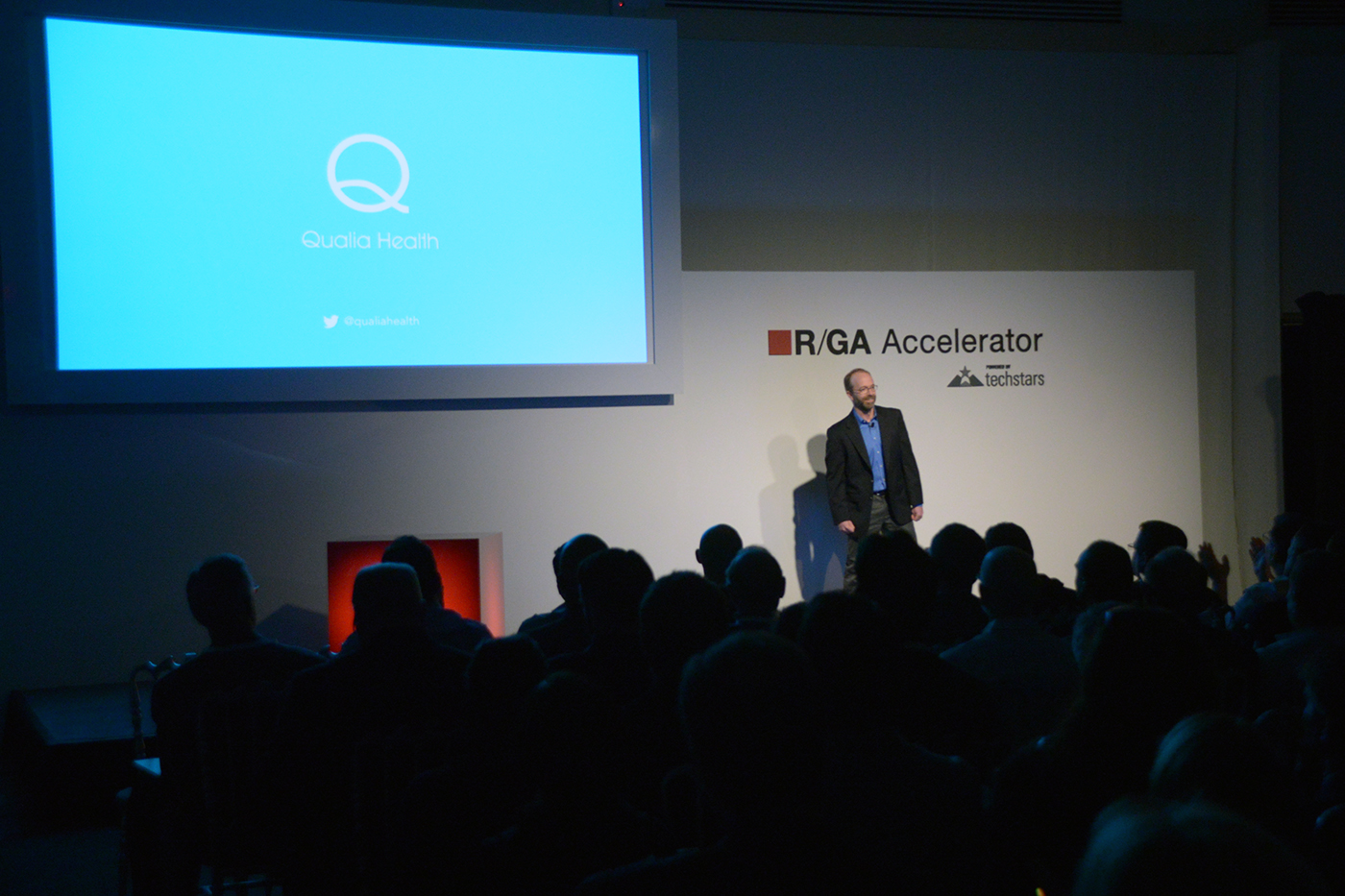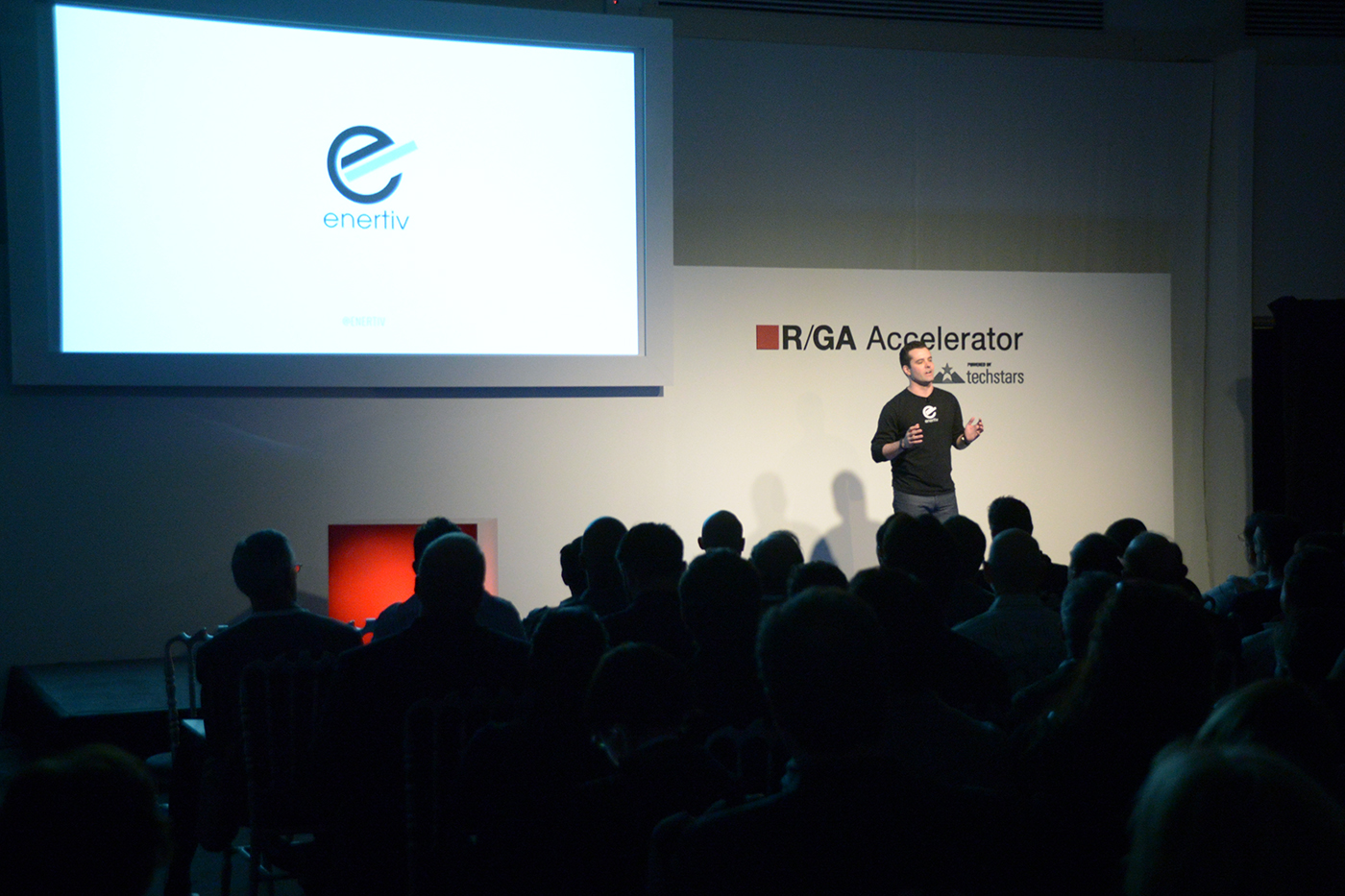New York has a long history of being a place where products get made – and where business gets done. Now, enter an accelerator that combines the resources of ad agency R/GA, with its impressive client list and 1300 employees (“the companies had access to the full range of R/GA staff and services,” said R/GA COO Stephen Plumlee, who kicked off the evening), partnered with Techstar’s experience in accelerating startups (“think of the unfair advantages these companies get,” noted Techstars founder David Cohen, “community and network is what it’s about”), add managing director Calvin Chu’s deep history in the hardware/connected device world, and it was no wonder that it was a packed house – and an impressive group of companies – at the R/GA (powered by Techstars) Connected Devices New York demo day.
Not only that, but now the fund begins, as Plumlee also announced that the agency is in the process of launching R/GA Ventures, which will invest in startups, and that there will be a second Connected Device Accelerator program in Fall.
It’s all connected.
And so without further ado, the nine companies who’ve developed tech that connects the physical and digital worlds, and will help to firmly establish New York’s place as a once and future maker town.
Click here to see the 9 hottest connected devices startups that you need to know about
Keen Home
“Over 50 years ago, a man gave us a vision of the home of the future,” said Keen Home’s Nayeem Hussain, “that man was George Jetson.” And Keen Home is a start, developing intelligent devices for your home, starting with a connected air vent for home heating and cooling systems that learns the occupants’ habits, and gives you what you need, where and when you need it (do you use one light switch to control your entire home, after all?). The vents connect with your smart phone, and the system not only learns your habits. It saves you on energy bills and pays for itself in energy savings in a year. Modular in design, the vents are interchangeable. The company announced a grant from NYU, and a pilot program that they will be doing with all of the university’s facilities.
Owlet
So, you’re a brand new parent. You’re taking the new baby home from the hospital, where he/she has been monitored 24/7 since birth, and suddenly, you’re on your own. Now what do you do? Besides panic? And lose sleep over the fear of SIDS? The Owlet Baby Care is a smart sock that monitors information like heart rate, breathing, sleeps quality and skin temperature, and transmits the information via Bluetooth (or over your wireless network) to your smart phone or any connected device, in real time. The company is establishing partnerships with Target, Buy Buy Baby, Babies R Us, Amazon and Peterson Medical. Presently, the device is available direct to parents through the company’s website. And since the sock also collects data, Rutgers University is using it to study infant sleep. “Big data solves big problem,” said co-founder Kurt Workman, himself a new first-time father “Five years ago, the technology wasn’t there. Five years from today, all babies will go home with a device.” Owlet is the first baby health monitor that tracks what really matters. Lucky for newborns, we’ve come a long way, baby.
Footmarks
The first rule of retail: Know your customer. Footmarks is a beacon technology platform that brands use to create location-aware, personalized shopping for customers.
People still love stores – that’s still where 80% of purchases are made. Still, we all know that good help is hard to find, and what salesperson knows a customer’s purchasing history? Footmarks turns retail into a more intelligent platform, via mobile, by delivering personalized content, including information about deals and sales, to customers. It’s a mobile retail app that’s actually useful inside the store. Or museum, or airport or any physical space, for that matter. Think about it: you can be sent deals while shopping. It can streamline payment processing. Check you in when you arrive at your hotel. Deliver relevant content in museums. Alert you when your baggage has arrived at the airport. The possibilities are endless, when mobile goes functional in the real world.
Qualia Health
Say you have a chronic condition. You can’t live in a doctor’s office 24/7, but Qualia Health may be the next best thing. While giving you the freedom to go about your daily life. QH helps patients monitor themselves between doctor visits by bridging the gap between healthcare and consumer-grade sensor technologies, utilizing devices such as Fitbit, Withings scale, and iHealth blood pressure cuff, plus asking a few simple questions that the patient answers on mobile to measure a patient’s mental outlook and social health as well. The end result: it helps to improve a patient’s health, and cut down on doctor visit – and medical costs. It also gives medical practitioners an idea of what’s going on with their patients when they’re not there to monitor them. Qualia is currently participating in a pilot study at Northwestern.
Enertiv
Enertiv is revolutionizing the way energy is managed in buildings, by making real-time energy data accessible, intuitive and actionable – and helping building owners to save money and energy in the process. The company designs and manufactures proprietary energy meters and sensors that are easily installed. The information on specific energy usage is delivered to their cutting-edge energy management software. And through intuitive visualizations, Enertiv guides owners, occupants, and operators about how to most effectively manage their energy use. Considering that commercial buildings pay $6 billion annually in energy waste, the system pays for itself in a year. The target market: commercial buildings and schools. In the last month alone, the company signed contracts with Cowork.rs, the New School, Ohio State University, Equinox and a large commercial property management company.
Ringblingz
How many messages do you receive a day, through one social platform or another? Not to mention your mobile? It’s only getting worse. The average teen checks his or her smartphone every six minutes, so as not to miss a critical message. And seriously, how many of those message are really important to you? Enter Ring Blingz, a social notification platform cleverly disguised as a piece of customizable jewelry – be it a ring, bracelet or belt clip (for the Y chromosome crowd) – that keeps you connected and let’s you know via a light or vibration, when you’re being pinged by someone who is important to you – and your phone’s not easily accessible. Named by Wearable Week as the Best Newcomer at SXSW, and at a $40-$60 price point, it’s within the budget of the 40 million teenagers in the US (there are 700 million of them worldwide) and easily will be one of the no-brainer gifts of choice for anyone angling for the title of Coolest Auntie or Uncle.
Grove
Grove Labs takes on one of the planet’s oldest professions: agriculture. The company has developed an appliance that anyone can use, and that may well be (hopefully) as ubiquitous as a kitchen appliance as is your refrigerator. It’s a beautiful home farming application that allows anybody to grow a salad a day, right at home, with the push of a button (talk about farm to table!). Without chemicals, and let’s face it: the closer to home that the produce is grown the produce, the healthier and more nutrient-filled it is. While building this appliance, the company also developed software and hardware to track and automate every facet of the controlled growing environment – and it’s scalable. Grove Labs are supplying this technology to indoor farms around the world, from modular shipping container farms to greenhouses. They also collect data from all of these indoor farms, using algorithms to share best practices and offer tailored suggestions on how to grow food and increase productivity and efficiency. UAE (who currently import 90% of their produce), Mexico and Oman have already instituted pilot programs.
Hammerhead
The device looks like a hammerhead shark head and as any urban cyclist knows, out there on the streets, you’re pretty much navigating shark waters. Considering that bicycles outsell cars and that shared bike programs are expanding in cities around the world, Hammerhead’s timing couldn’t be better. The device connects to your handlebar, you program your destination into your smartphone, and Hammerhead lights the way – literally. No more getting lost and having to ride up that big hill you just breezed down. By creating cyclist-centric mapping, the Hammerhead team – cyclists themselves – are building a global network of safe bike routes with relevant, meaningful information for bikers. The future of cycling is here! Available this summer ($99), they’ve already had pre-order from 35 different countries. Time to saddle up and enjoy the ride – and the light show.
Alvio by Qol
Asthma, the most common chronic disease affecting Americans, can be reduced 86% through proper tracking and breathing training. Through something like, say, Respii, the first and only mobile-connected respiratory training and therapy device. Respii engages users, including bronchitis and emphysema sufferers, through a rich interactive mobile and social experience, helping to them practice more often and for longer stretches, by making the process more engaging. This means athletes can gain longer endurance when they run, swim and cycle, chronic respiratory patients can gain more control over symptoms, and post-operative patients can recover more quickly and avoid readmission. It looks like a game, so it’ll encourage kids to do their breathing exercises. Analytics and reporting included. The company announced a clinical study with Albert Einstein/Montefiore Hospital and if all goes well, they’ll be well on their way to helping millions to breathe easier.













